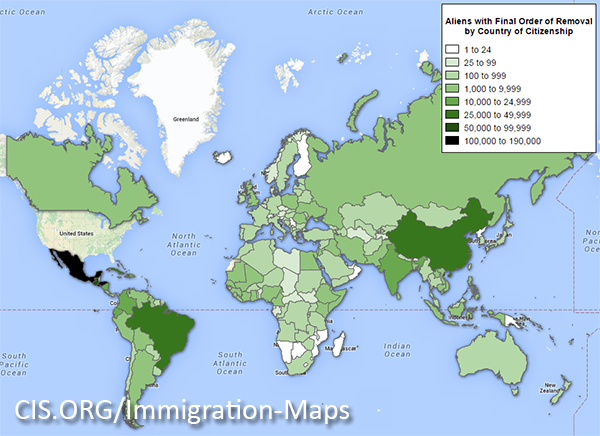925,000 Aliens Ordered Removed Have Not Departed
Article subtitle:
One year after Kate Steinle's death, no progress on enforcement
Article publisher:
Center for Immigration Studies
Article date:
1 July 2016
Article category:
National News
Medium
Article Body:
Our nation's immigration-enforcement system remains dysfunctional on the one-year anniversary of the killing of Kate Steinle in San Francisco by a five-time-deported illegal-alien felon, according to a new report by the Center for Immigration Studies. The report reveals that at this time last year, more than 925,000 aliens who had been ordered removed from the United States had not departed. Most are still at large in American communities, including more than 170,000 convicted criminals.

The report includes maps showing the countries of citizenship of these aliens. View the full analysis.
Jessica Vaughan, director of policy studies at the Center and author of the report, found that the number of non-departed post-final-order aliens has grown about 20 percent since 2012.
According to Vaughan, these aliens, who have all exhausted all due process and appeals, are still here because they skipped out on their immigration proceedings, or because their home country refused to take them back, or because of local sanctuary policies that prevent their deportation, as in the case of Steinle's killer.
Said Vaughan: "These figures are a disturbing indication of profound dysfunction in our immigration system. Hundreds of thousands of the illegal aliens living here have already gone through the deportation process, but they are still here. And tens of thousands of deportable criminal aliens are still at large causing harm in American communities. Following through on these deportation orders would be an easy way to lighten the fiscal and social burden that immigration imposes, and improve public safety to boot."
Aliens from Mexico, El Salvador, Honduras and Guatemala compose about 60 percent of the aliens. A disproportionate number of the non-departed criminal aliens are citizens of Cuba.
Vaughan said, "The size of the non-departed population could be reduced if immigration agencies used more efficient forms of due process to shorten the proceedings, if visa sanctions and other tools were used to incentivize cooperation from countries that refuse to accept their citizens back, and if steps were taken to deter local sanctuary policies."
